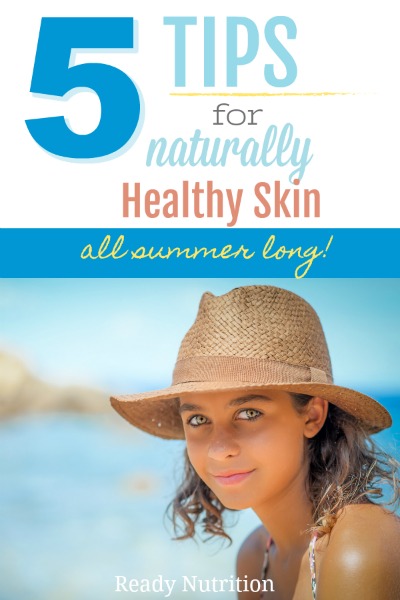
The warmer, more humid weather in the summer means our skin isn’t as dry and itchy as it was in the winter; but that’s no excuse to neglect your skin. As the largest organ of the integumentary system, it’s important to protect your skin, but doing so in a natural and earth-friendly way is often difficult. So we’ve come up with five tips and tricks designed to help you get the most out of nature’s bounty while caring for skin this summer.
1.Moisturize, But Avoid Drying Ingredients
While there are many products out there proclaiming to be “all natural,” the only sure way you’ll really know, is by reading the ingredient list. This is where personal preference plays a key role. For example, some people do not mind alcohols in products used on their skin. They offer a range of excuses from “the concentration is so small” to “companies wouldn’t use it if it was bad for me.” And that’s ok too! But more natural ways are available. Personal preference should come first, but you should also know that all alcohols can cause dryness and a sort of addiction to a product using dryness. Once you get itchy and uncomfortable, you’ll be slapping on some more of the alcohol-laced product with the same drying and itchy results.
The skin has a natural barrier that helps seal in moisture and protects from environmental stressors and other damaging elements. Alcohol disrupts this barrier, leaving the skin more vulnerable to attack from irritants, allergens, bacteria, and viruses. In a 2003 study, scientists noted this to be true in doctors who were using alcohol-based cleansers to get germs off their hands. They found that it removed “barrier lipids” (healthy fats in the skin) and caused the skin to lose moisture and hydration. Evidence showed that modern foaming liquid cleansers were the major offender, and that replacing them, reduced hand problems among hospital staff.
But not all alcohols are equal either. Cetyl Alcohol is a fatty alcohol that helps other ingredients absorb into the skin. It can be useful and probably doesn’t need to be avoided like the plague.
But a moisturizer is still important. You want to seal in as much water as possible by creating a barrier to prevent moisture loss from the skin. Try coconut oil! Straight from the container, organic non-GMO coconut oil is one of the most versatile items you can have. Coconut oil’s skin benefits include: strengthening underlying epidermal tissue, removing dead skin cells, and protecting us from sunburns. It also contains antibacterial, antiviral, antifungal and antioxidant properties. Research even shows that coconut oil is strong enough to fight chronic skin diseases characterized by defects in the epidermal barrier function and cutaneous inflammation, including atopic dermatitis (AD). Coconut oil can be used on its own as a standalone moisturizer, and its a good one too!
Related: Here are some other ways coconut oil can bring out your natural beauty
2. Avoid The Sun And ALWAYS Wear A Non-Toxic Sunblock
This should be a no-brainer anymore. Personally, I never go outside in the summer or winter, without a hat and sunblock. If I’m going to be outside for long periods of time (over an hour), I forego my comfort and wear long-sleeved shirts and pants. I also avoid sandals as my feet are usually neglected by sunblock application. The more protection from the sun you can give your skin the better. Don’t skip the sunblock in favor of that “healthy glow.” Dermatologists can agree on one thing: there’s no such thing as a safe tan. Wear a safe, non-toxic sunscreen, even on cloudy days or days you’ll be inside a lot. Skin cancer is the number one cancer in the US now and the sun’s rays are rather proficient at aging you significantly.
To avoid a toxic sunscreen, make sure yours has no oxybenzone. This commonly used ingredient gets into the bloodstream and acts like estrogen in the body. It can also trigger allergic reactions. Look for a mineral sunblock containing zinc oxide or titanium dioxide. Those will inevitably leave a “white cast” but it’s far superior (in my humble opinion) to getting skin cancer or slathering on a toxic chemical.
When choosing a sunscreen, look for an SPF of at least 30, even if you don’t have fair skin. Many sunscreens with an SPF from 50 to 100, effectively block just 1-2% more sunburn rays than an SPF 30 products. Regardless of which SPF you choose, you should reapply often (ideally every 90 minutes), and always after swimming.
Try Garden Goddess’ natural sunscreens!
3. Exfoliate your skin at least once a week, ideally twice.
Dead cells sit on the surface of your skin making it look dull, rough and dry. By exfoliating, you are removing these dead cells, allowing your more radiant, healthier summer skin to shine through. Exfoliating also allows skin cells to regenerate more quickly, which keeps aging at bay. Whenever possible, choose a gentle, more natural exfoliator. Some “fruit acid” exfoliators such as alpha hydroxy acid and beta hydroxy acid (AHA and BHA) can actually be very harsh and cause significant irritation. Choose products with natural exfoliating grains instead.
You could also try an agave exfoliating cloth in your shower. They are made from the agave plant, and won’t break the bank, costing less than $10. No fancy creams or chemicals needed!
4. Get Enough Sleep!
Although this is an important tip in the winter too, sleep is one of the best and most natural ways to refresh your skin. Americans, however, are chronically sleep deprived. Lack of sleep can lead to increased levels of stress hormones, which may slow the production of collagen in the skin. When our skin stops producing collagen, it begins to lose elasticity and starts looking tired and worn. Your body boosts blood flow to the skin while you snooze, which means you wake to a healthy glow. Skimping on sleep and your complexion can look drab, ashen, or lifeless.
5. Drink A LOT Of Water
One of the most natural ways on Earth to impact your skin health is by drinking water. Drinking water helps removes toxins from the skin and if your skin is not getting the sufficient amount of water, the lack of hydration will present itself by turning your skin dry, tight and flaky. Dry skin has less resilience and is more prone to wrinkling. As water is lost in large quantities every day, you need to replace it somehow. The unfortunate truth about drinking water and skin is that water will reach all the other organs before it reaches the skin, so make sure you’re abiding by step one and moisturizing with non-drying and natural ingredients.
Some will disagree that water has an effect on the skin at all, however, many people often report (myself included) that by increasing their water intake, their skin has a more radiant and healthy glow. Those who suffer from acne have reported the same results. Nothing will happen overnight, but even a good couple of weeks of increasing water intake should be enough for you to see how proper hydration affects your own skin.

